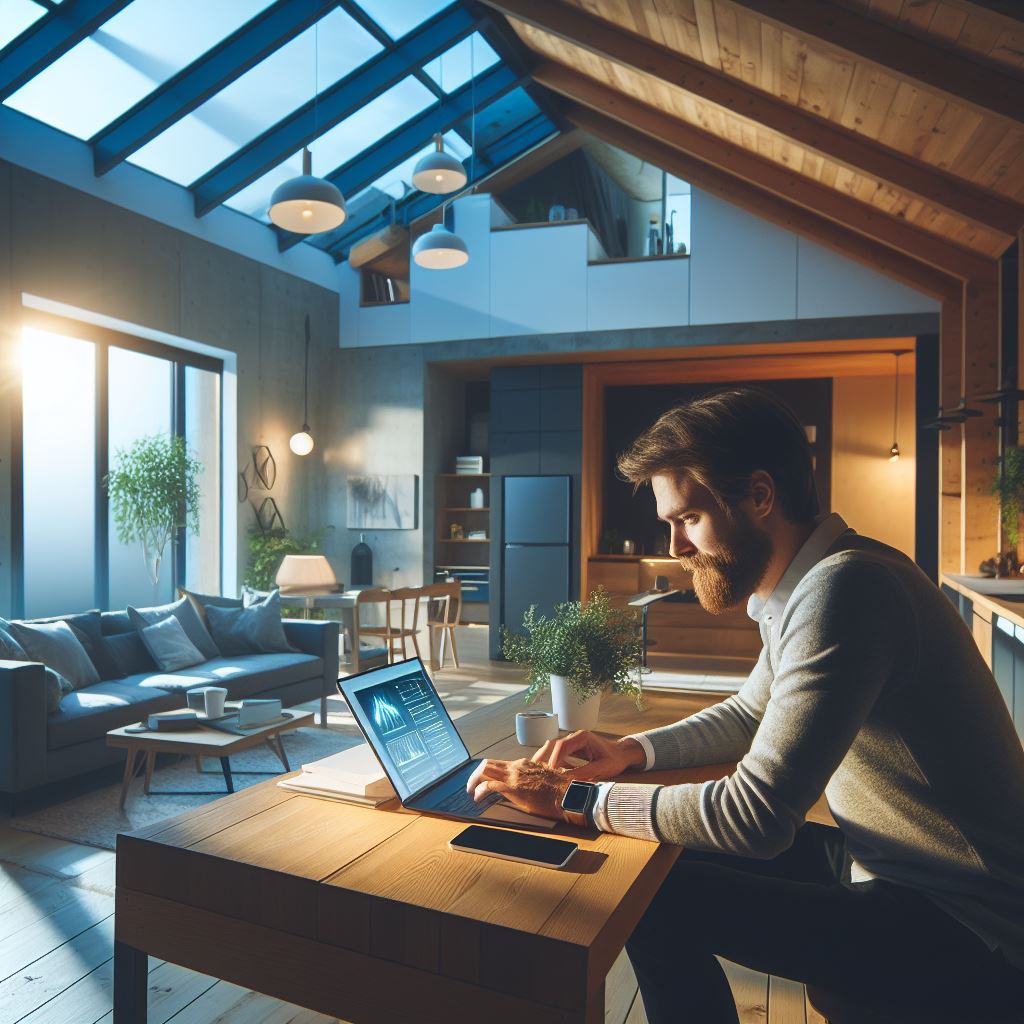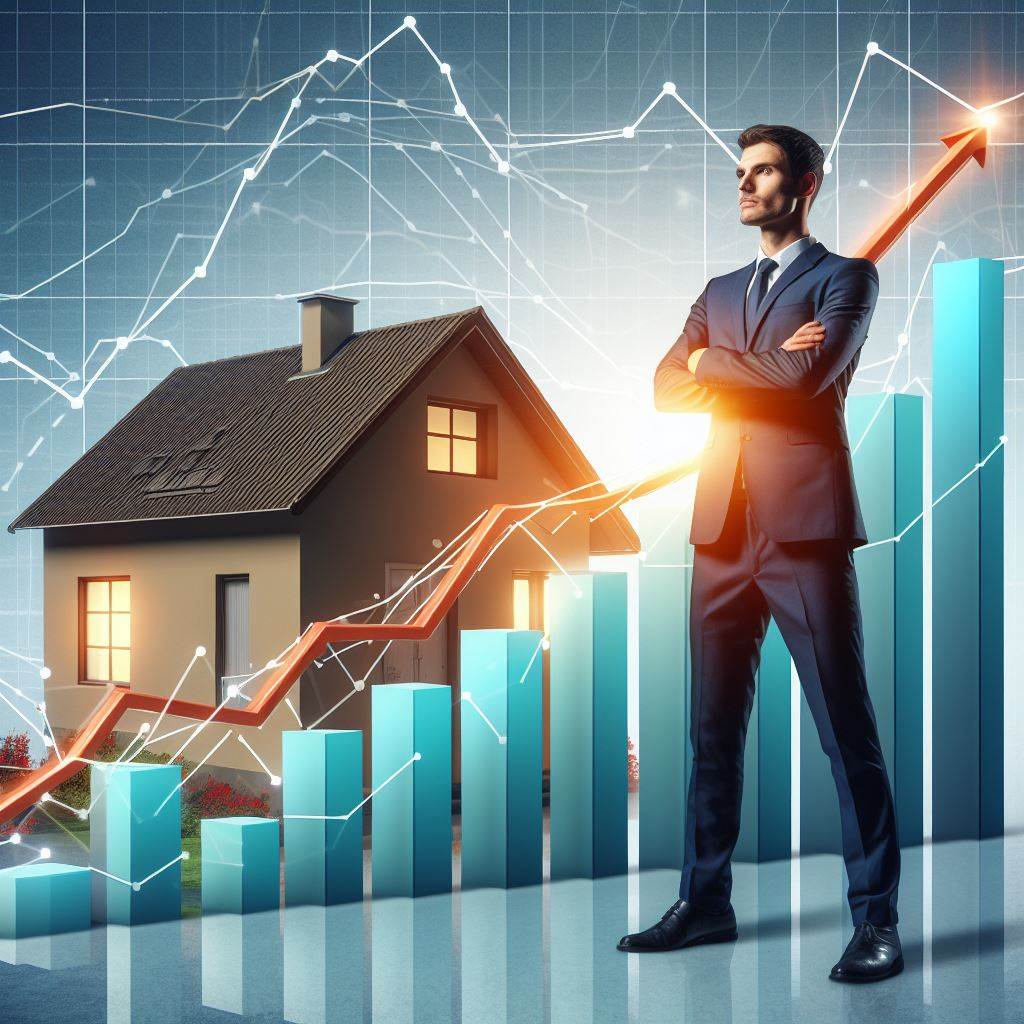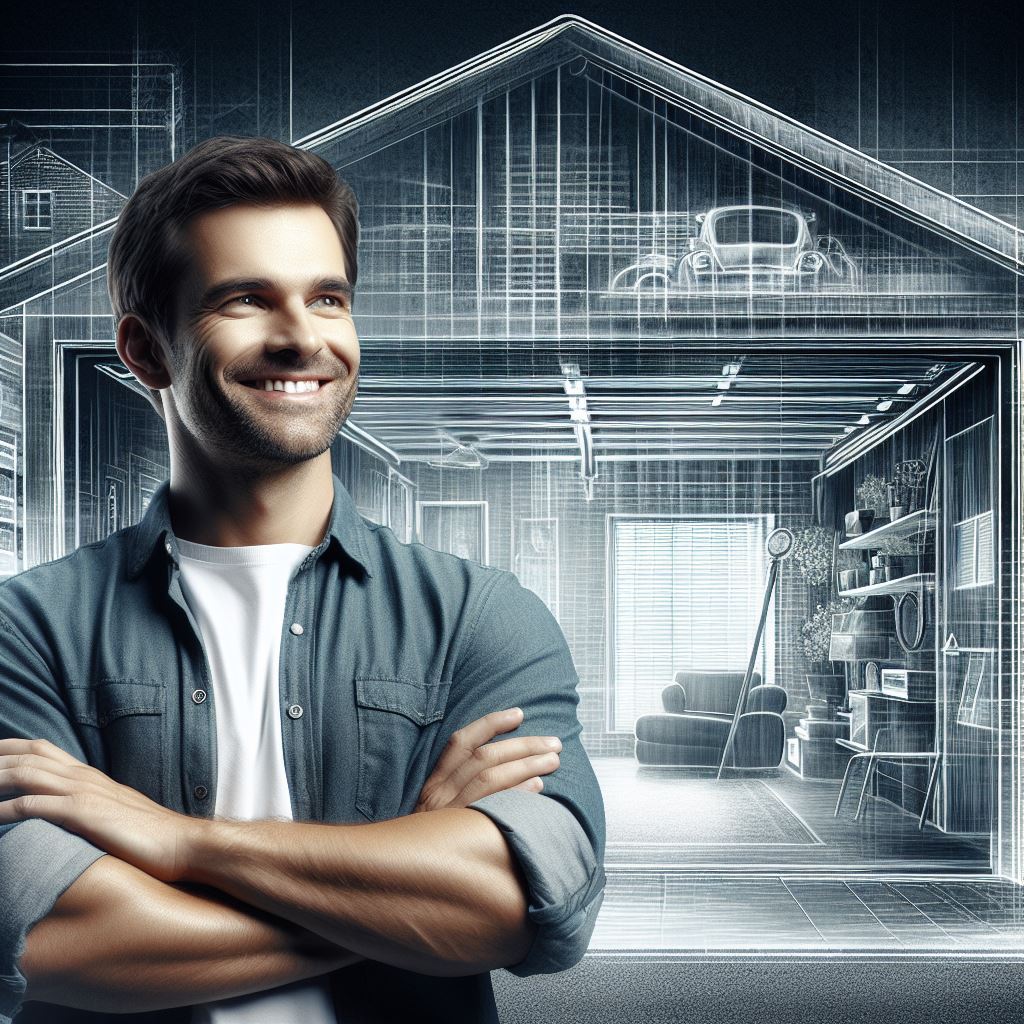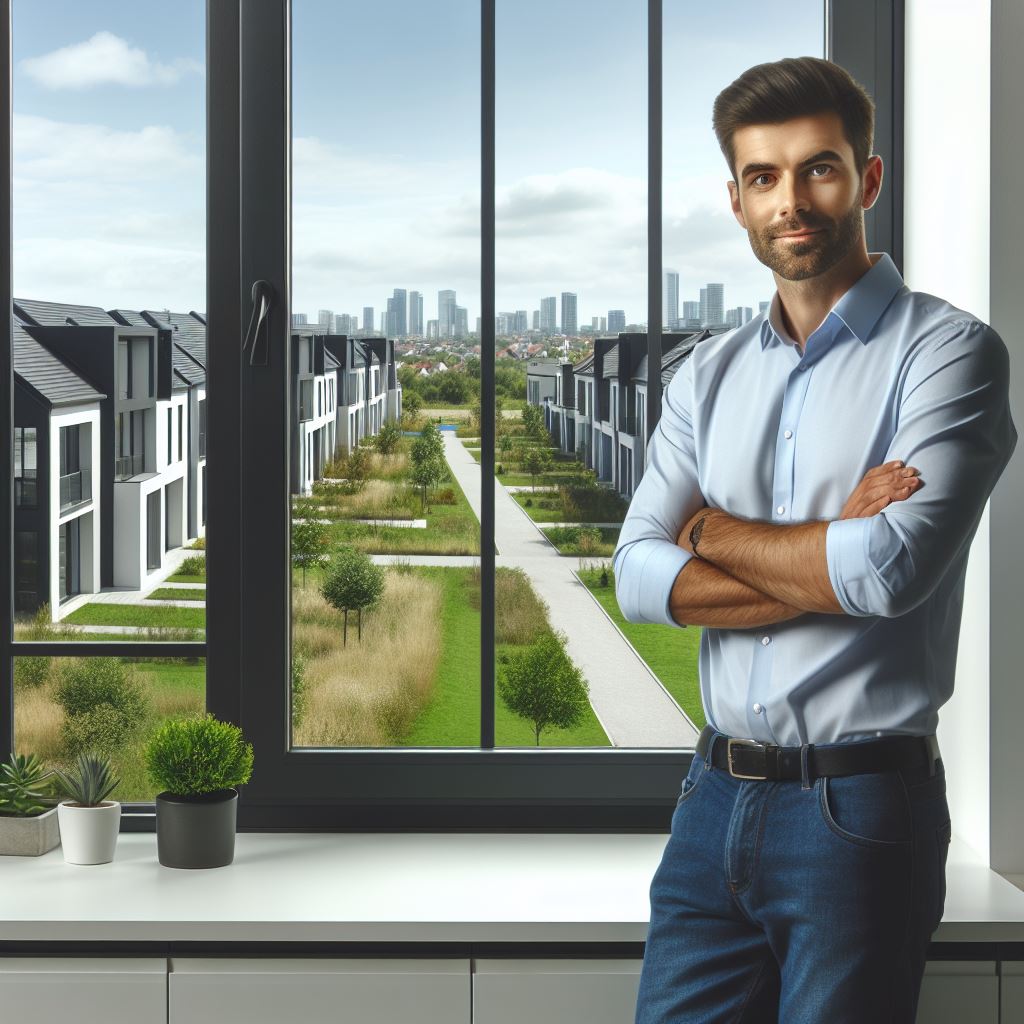Introduction
Smart technology has become a prominent feature in modern home builds, revolutionizing the way we live.
In this blog post, we will explore the various advancements in smart tech and how they enhance our daily lives at home.
This blog post aims to inform readers about the benefits and possibilities of incorporating smart technology into their home designs.
By delving into different aspects of smart tech, readers can gain insights into how it can improve their comfort, convenience, and efficiency.
Readers can expect to learn about the latest smart devices and systems available for modern homes.
We will delve into the integration of voice-controlled assistants, such as Amazon Echo or Google Home, and how they can streamline daily tasks.
Additionally, we will explore the possibilities of smart thermostats, lighting, security systems, and appliances, highlighting their potential to increase energy efficiency, boost security, and improve overall quality of life.
Furthermore, this post will touch upon the advancement of home automation systems that offer comprehensive control over various aspects of the home, including heating, entertainment, and ambiance.
Readers will discover the convenience and comfort that smart homes can provide, along with the potential cost savings and environmental benefits that come with these technological advancements.
Through this blog post, readers will gain a better understanding of the wide range of benefits that smart technology in modern home builds can bring, empowering them to make informed decisions when it comes to integrating these innovative solutions into their own homes.
The Definition of Smart Tech in Modern Home Builds
The concept of smart technology in the context of home builds
In today’s increasingly connected world, the concept of smart technology in modern home builds has gained immense popularity.
Smart tech refers to the integration of digital features and automation systems within a home, allowing homeowners to control various aspects of their living environment with ease and convenience.
Smart tech involves the use of internet-connected devices and sensors that can be remotely controlled and accessed through a smartphone or other smart devices.
These devices can include smart thermostats, lighting systems, security cameras, and even appliances.
One of the key benefits of incorporating smart tech in home builds is the enhanced level of convenience it provides.
Homeowners can remotely adjust the temperature, turn lights on and off, or even monitor their home’s security system while being away.
How it involves the integration of digital features and automation systems
Another advantage is the energy efficiency that smart tech offers.
With the integration of smart thermostats, homeowners can program their heating and cooling systems to optimize energy usage based on their lifestyle and preferences.
This can result in significant cost savings and a reduced carbon footprint.
Additionally, smart tech can greatly improve home security.
Integration of smart locks and security cameras allows homeowners to remotely monitor and control access to their homes.
They can receive real-time alerts and notifications in case of any suspicious activity, ensuring a heightened level of safety.
Furthermore, smart tech can enhance the overall functionality and comfort of a home.
The ability to control various aspects of the home through voice commands or a mobile app offers a seamless living experience.
For instance, homeowners can automate their home’s lighting to adjust based on the time of day or their personal preferences, creating the perfect ambiance.
The benefits of incorporating smart tech in homes
Moreover, incorporating smart tech in modern home builds can increase the property value.
Homebuyers are increasingly considering smart homes as a desirable feature, and having a home equipped with smart technology can make it more attractive in the real estate market.
It’s important to note that while the benefits of smart tech in homes are undeniable, there are also potential considerations.
Privacy and security concerns may arise due to the collection and storage of personal data by connected devices.
Therefore, it is crucial for homeowners to ensure proper cybersecurity measures are in place.
In fact, smart technology in modern home builds offers numerous advantages, including convenience, energy efficiency, enhanced security, improved functionality, and increased property value.
As technology continues to advance, incorporating smart tech in homes will undoubtedly become an increasingly common practice.
Read: Eco-Friendly Renovations: Top Trends
Popular Smart Tech Features in Modern Home Builds
In modern home builds, there is an increasing integration of smart tech features that enhance convenience, efficiency, and safety.
Let’s explore some of the popular smart tech features found in modern homes:
Voice-Controlled Assistants
Smart home devices such as Amazon Echo and Google Home have gained popularity due to their ability to provide hands-free control over various functions within the home.
These voice-controlled assistants can perform tasks such as playing music, answering questions, and controlling other smart devices.
Automated Lighting Systems
Gone are the days of manually turning on and off lights.
Modern homes now feature automated lighting systems that can be controlled remotely using smartphones or voice commands.
This feature not only enhances convenience but also helps in energy conservation.
Smart Security Systems
With increasing concerns about home security, smart security systems have become a common feature in modern home builds.
These systems include smart door locks, surveillance cameras, and motion sensors that can be monitored and controlled through smartphone apps.
They provide homeowners with peace of mind by enhancing the safety of their homes.
Energy Management Systems
Smart tech has revolutionized home energy management by providing homeowners with the tools to monitor and control their energy usage.
Smart thermostats, for example, allow users to regulate their heating and cooling systems remotely, ensuring optimal energy efficiency and cost savings.
Home Entertainment Systems
Modern homes are equipped with advanced home entertainment systems that offer immersive audio and video experiences.
High-end speakers, smart TVs, and streaming devices allow users to enjoy their favorite movies, music, and shows with exceptional quality and convenience.
Automated Window Treatments
Smart motorized blinds and shades are becoming increasingly popular in modern home builds.
These automated window treatments can be controlled remotely or programmed to adjust automatically based on factors such as sunlight, temperature, or time of day.
They add convenience and energy efficiency to homes.
Smart Appliances
From refrigerators with touch screens to washing machines with Wi-Fi connectivity, smart appliances are changing the way we interact with everyday household tasks.
These appliances often have advanced features, such as remote control and energy monitoring, making them more convenient and efficient to use.
Home Monitoring Systems
Smart home monitoring systems provide homeowners with real-time information about their home’s security, energy usage, and environmental conditions.
These systems can detect issues such as leaks, smoke, or carbon monoxide, enabling quick responses and potentially saving lives.
Automated Home Control Systems
Centralized home control systems, such as Samsung SmartThings or Apple HomeKit, allow users to manage multiple smart devices from a single interface.
These systems streamline the user experience, providing easy access and control over various aspects of the home.
Virtual Assistants
Virtual assistants like Siri, Alexa, and Google Assistant have become an integral part of many modern homes.
These intelligent AI-powered systems can perform tasks, answer questions, and provide information, all through voice commands, offering a seamless and efficient experience.
In short, smart tech features in modern home builds have transformed the way we interact with our living spaces.
Voice-controlled assistants, automated lighting systems, smart security systems, and many other smart features enhance convenience, efficiency, and safety, making our homes more comfortable and intelligent than ever before.
Read: Roofing Projects: Permitting Essentials

Energy Efficiency and Smart Home Builds
Smart home builds have revolutionized the way we live, bringing convenience and efficiency to our fingertips.
Not only do these technologically advanced homes offer comfort, but they can also contribute significantly to energy efficiency and sustainability.
Integration of Smart Thermostats
One key component in smart home builds is the integration of smart thermostats.
These devices allow homeowners to control and manage their home’s temperature remotely, optimizing energy usage.
With smart thermostats, homeowners can adjust the temperature based on their needs and preferences.
They can set different temperature settings for different times of the day, ensuring that energy is not wasted when nobody is home.
This feature helps reduce utility bills and minimizes energy consumption.
Additionally, smart thermostats learn daily routines and adapt accordingly.
They can automatically adjust the temperature based on patterns, saving energy by reducing heating or cooling when it is not necessary.
Smart Appliances in Energy Management
Another important aspect of smart home builds is the integration of smart appliances.
These appliances are designed to be energy-efficient and can be controlled remotely using smartphones or other smart devices.
Smart appliances, such as refrigerators, washing machines, and dishwashers, can be programmed to run during off-peak hours when electricity rates are lower.
This not only saves money on utility bills but also reduces strain on the electrical grid during peak hours.
Furthermore, smart appliances can provide real-time energy usage data, allowing homeowners to monitor and analyze their energy consumption.
This information enables them to make informed decisions on energy usage, leading to more efficient practices.
Optimizing Energy Usage
The integration of smart thermostats and appliances offers homeowners the ability to optimize energy usage in various ways.
For example, smart home builds can include lighting control systems that automatically adjust the brightness and intensity of lights based on natural light levels in a room.
This feature eliminates unnecessary energy consumption and creates an energy-efficient lighting environment.
Additionally, smart home builds can incorporate automated window shades that adjust based on weather conditions.
By blocking sunlight during hot summers, these shades reduce the need for air conditioning, resulting in energy savings.
Reducing Utility Bills
Smart home builds are not only environmentally friendly but also cost-effective.
With the integration of smart technologies, homeowners can significantly reduce their utility bills.
By optimizing energy usage through smart thermostats, appliances, and automated systems, homeowners can avoid wasted energy and only use what is necessary.
This reduces the amount of energy drawn from the electrical grid, resulting in lower utility bills.
Moreover, the ability to monitor and analyze real-time energy usage data empowers homeowners to identify areas of improvement and make energy-saving adjustments.
This information allows for informed decision-making and further reduces utility expenses.
Smart home builds have become more than just a trend; they offer homeowners the opportunity to live in energy-efficient and sustainable environments.
By integrating smart thermostats, appliances, and automated systems, homeowners can optimize energy usage, reduce utility bills, and contribute to a greener future.
Read: Hidden Costs in Historic Home Renovations
Smart Home Security and Safety
In the rapidly evolving landscape of modern home builds, the integration of smart technology is not just a luxury but a necessity
Among the myriad of advancements, one area that stands out for its paramount importance is smart home security.
In this section, we delve into the innovative realm of smart security systems, exploring their significance and the transformative benefits they bring to contemporary households.
Gone are the days of relying solely on traditional locks and alarm systems.
The advent of smart security technologies has ushered in a new era of safeguarding homes and ensuring the safety of its occupants.
Video doorbells, smart locks, and surveillance cameras have become the cornerstones of this revolution, offering a comprehensive approach to home security.
The importance of smart security systems in modern homes
Highlighting the importance of these smart security features is crucial in understanding their role in protecting modern households.
With crime rates on the rise, having a proactive defense mechanism is imperative.
Smart security systems act as a vigilant guardian, providing real-time monitoring and instant alerts in case of suspicious activities.
The benefits of video doorbells, smart locks, and surveillance cameras
Video doorbells, equipped with high-definition cameras and two-way communication, allow homeowners to screen visitors remotely.
This not only adds a layer of convenience but also serves as a deterrent to potential intruders.
Smart locks, accessible through smartphones, enhance control over entry points, eliminating the risks associated with lost or duplicated keys.
Surveillance cameras, strategically placed around the property, provide a 24/7 watchful eye. With features like motion detection and cloud storage, homeowners can review footage at their convenience and share critical information with law enforcement if needed.
How these features improve home security and offer peace of mind
The benefits of these smart security features extend beyond mere deterrence.
They foster a sense of peace of mind, allowing homeowners to go about their daily lives without constant worry.
The ability to monitor and control access remotely adds an unprecedented level of flexibility and control, ensuring that homes remain sanctuaries of safety.
In essence, the integration of smart security systems in modern home builds is not just a technological flourish; it is a fundamental response to the evolving challenges of our times.
Video doorbells, smart locks, and surveillance cameras collectively redefine home security, providing a proactive shield against potential threats and instilling a newfound sense of security and tranquility in the hearts of homeowners.
Read: Balancing Modern Comfort & History
The Future of Smart Tech in Home Builds
In recent years, smart technology has become increasingly prevalent in modern home builds.
From voice-controlled assistants to automated security systems, these advancements are transforming the way we live.
As technology continues to evolve, let’s explore the upcoming trends and advancements in smart technology for homes.
Integration of Artificial Intelligence and Machine Learning
- Artificial Intelligence (AI) and Machine Learning are revolutionizing the way we interact with our homes.
- AI-powered virtual assistants like Amazon’s Alexa and Google Assistant have become household names.
- These assistants can perform a wide range of tasks, from controlling smart devices to answering questions.
- Machine learning algorithms analyze user behavior and adapt to provide personalized recommendations and services.
- Imagine a home that learns your preferences and adjusts the temperature, lighting, and music to your liking.
- This integration of AI and machine learning is set to become even more advanced in the future.
Potential Future Benefits
- One potential future benefit of smart tech in home builds is predictive maintenance.
- Smart devices can monitor and analyze data to detect potential issues before they become major problems.
- For example, a smart HVAC system can detect a faulty component and alert the homeowner for timely repairs.
- This proactive approach can save homeowners from expensive repair bills and ensure optimal performance.
- Another benefit is improved energy management.
- Smart thermostats can learn your schedule and adjust the temperature accordingly, saving energy and reducing costs.
- Connected appliances can optimize their usage based on energy tariff rates, further reducing the household’s energy consumption.
Smart Homes and Sustainability
- The integration of smart technology and sustainable features is a growing trend in modern home builds.
- Smart lighting systems use sensors to detect occupancy and adjust brightness accordingly.
- This helps reduce unnecessary energy consumption and lower electricity bills.
- Water management systems can detect leaks and automatically shut off the water supply to prevent wastage.
- Smart irrigation systems adjust watering schedules based on weather forecasts, saving water in the process.
- These sustainable features not only benefit the environment but also provide cost savings for homeowners.
Challenges and Considerations
- While the future of smart tech in home builds looks promising, there are a few challenges to address.
- Security and privacy are major concerns when it comes to connected homes.
- With more devices collecting and transmitting data, cybersecurity measures must be a top priority.
- Interoperability is another challenge, as various smart devices and platforms need to seamlessly communicate with each other.
- Standardization efforts and improved compatibility will be crucial in ensuring a smooth smart home experience.
All in all, smart technology is set to transform the way we live in our homes.
The integration of artificial intelligence, machine learning, and sustainable features will provide numerous benefits, from predictive maintenance to improved energy management.
However, addressing security, privacy, and interoperability challenges will be vital for a successful and seamless smart home experience.
Conclusion
Incorporating smart technology in modern home builds offers numerous benefits.
The main points discussed in this blog post include the convenience and efficiency that smart tech brings to homeowners.
From controlling various aspects of the home remotely to optimizing energy usage, smart tech enhances comfort while reducing costs.
Additionally, the increased security provided by smart devices ensures peace of mind.
By implementing smart technology, homeowners can enjoy a more connected and integrated living experience.
From smart speakers to video doorbells and smart thermostats, these devices enhance everyday life and make daily tasks more manageable.
Therefore, it is highly encouraged for readers to consider incorporating smart technology into their own homes.
The benefits of smart tech are vast and the advancements in this field continue to grow.
By embracing this technology, homeowners can experience a more efficient, secure, and comfortable living environment.
So why wait? Start exploring the world of smart technology and transform your home into a modern oasis of convenience and innovation.




